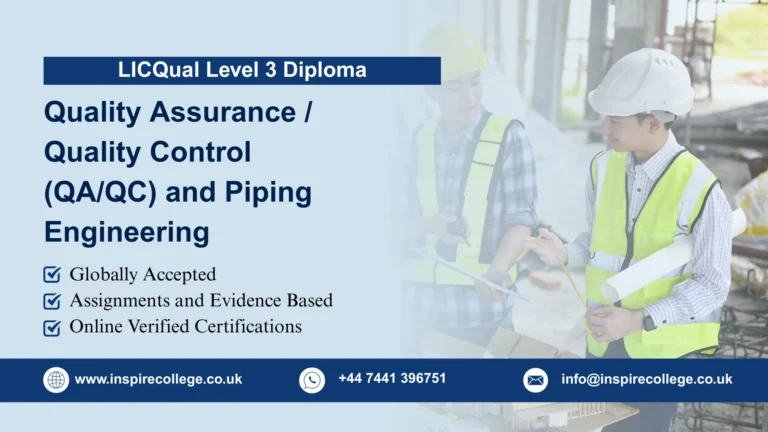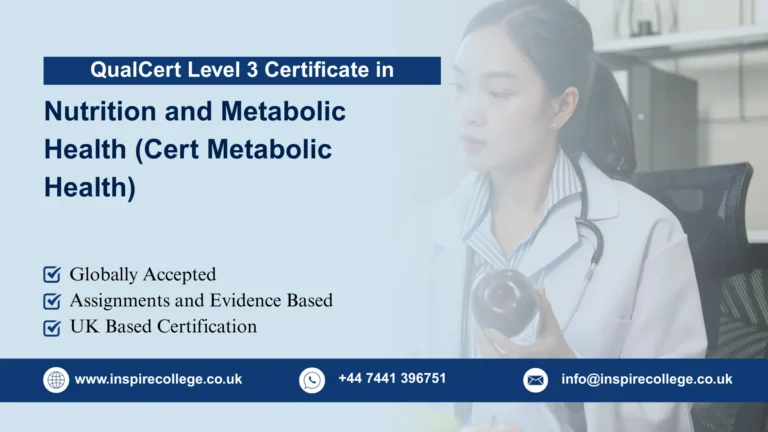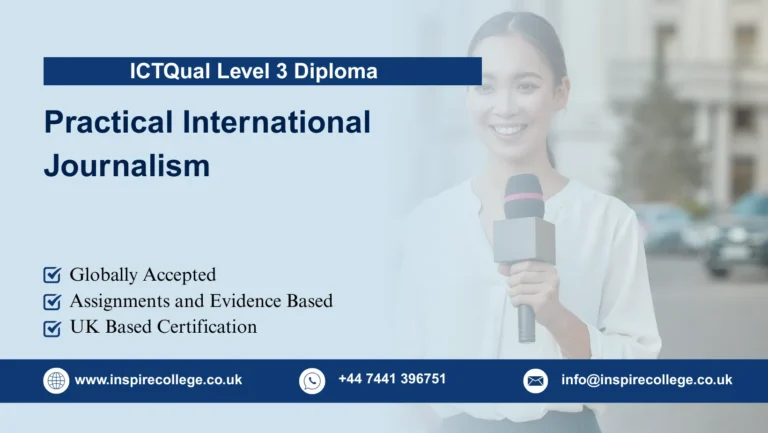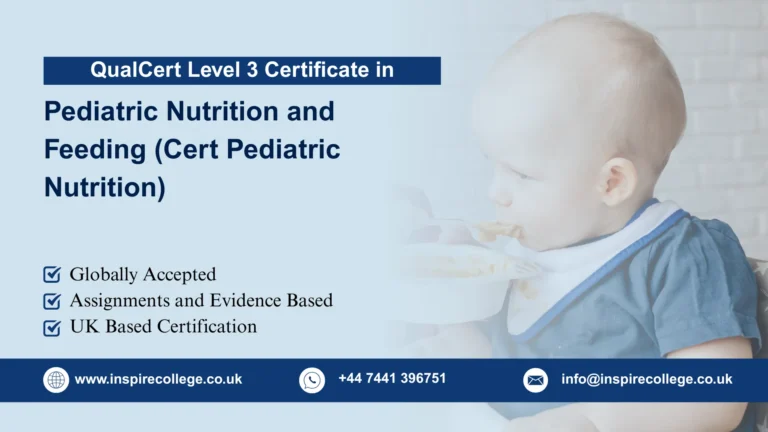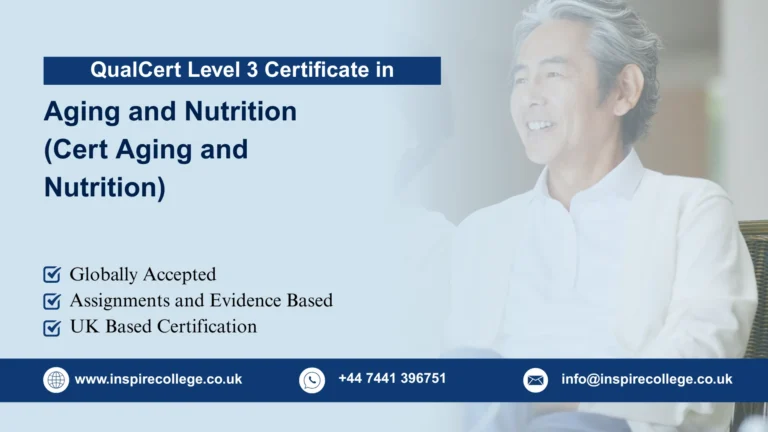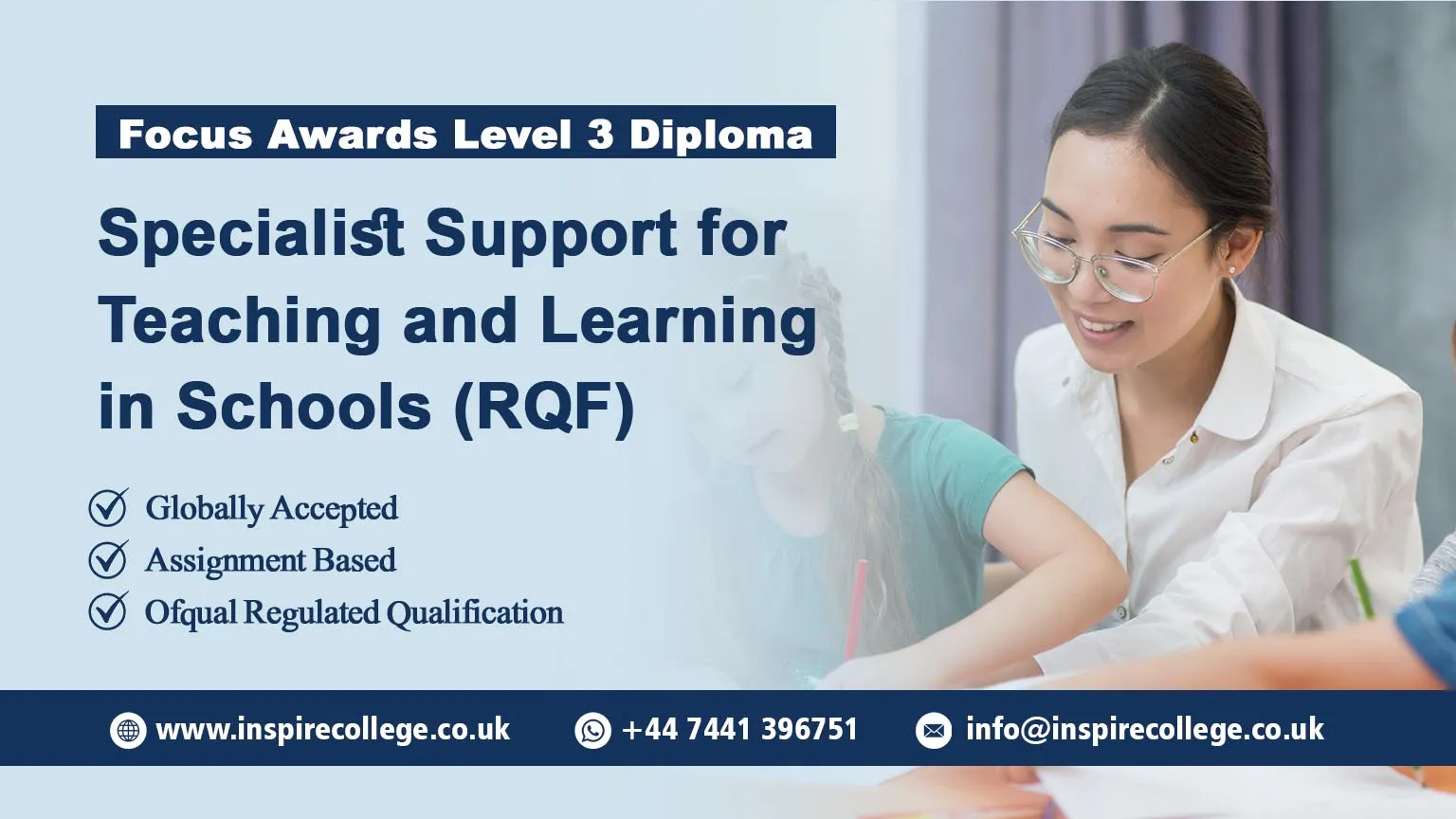
Focus Awards Level 3 Diploma in Specialist Support for Teaching and Learning in Schools (RQF)
The Focus Awards Level 3 Diploma in Specialist Support for Teaching and Learning in Schools (RQF) is a highly respected qualification designed for individuals aspiring to or currently working in support roles within the education sector. This diploma provides the foundational knowledge, skills, and practical experience needed to excel in specialist support roles, contributing significantly to the success and well-being of students in schools.
The Level 3 Diploma is tailored for those who wish to enhance their understanding of the educational environment, including the responsibilities and duties of teaching assistants, learning support assistants, and similar roles. The qualification is regulated by Ofqual, ensuring that the curriculum and assessment standards meet the rigorous requirements of the education sector. It equips learners with the knowledge to support children and young people effectively in their learning journey, focusing on areas such as safeguarding, child development, and professional communication.
This diploma is ideal for individuals who are passionate about supporting education but may not necessarily want to pursue a formal teaching qualification. It is particularly suited for those already working in schools or looking to enter the profession as specialist support staff. This includes roles such as teaching assistants, classroom support workers, and special educational needs (SEN) assistants.
Obtaining the Level 3 Diploma in Specialist Support for Teaching and Learning in Schools offers several career and personal development benefits. First, it opens the door to a wide range of roles in the education sector, including specialist positions that focus on SEN or behavioral support. Second, the qualification demonstrates a commitment to professional growth, enhancing employability and earning potential. Finally, it enables individuals to make a meaningful difference in the lives of students by providing high-quality support that fosters academic and personal success.
The Focus Awards Level 3 Diploma in Specialist Support for Teaching and Learning in Schools (RQF) is more than just a qualification; it is an opportunity to contribute meaningfully to the education sector. By equipping individuals with the skills and knowledge needed to support teachers and students effectively, this diploma plays a crucial role in shaping the future of education. Whether you are just starting your career or looking to enhance your existing skills, this program provides a solid foundation for success.
- Minimum Age: Applicants must typically be 16 years or older.
- Prior Experience (Preferred): Some experience working in a school or educational setting is advantageous but not mandatory.
- English Proficiency: A good command of written and spoken English to understand course materials and complete assignments.
- Access to a School Environment: Learners must have access to a school setting to complete the practical elements of the course, such as observations and assessments.
- Commitment: A willingness to commit to the time and effort required for studying and applying the concepts in real-world settings.
Mandatory Units
The Focus Awards Level 3 Diploma in Specialist Support for Teaching and Learning in Schools (RQF) qualification, learners must complete all mandatory units totalling 44 credits.
Mandatory Units
| Unit Title | GLH | Credits | ||
| Mandatory units | ||||
| Communication and professional relationships with children, young people and adults | 10 | 2 | ||
| Schools as organisations | 15 | 3 | ||
| Support learning activities | 20 | 4 | ||
| Promote children and young people’s positive behaviour | 15 | 3 | ||
| Develop professional relationships with children, young people and adults | 10 | 2 | ||
| Promote equality, diversity and inclusion in work with children and young people | 10 | 2 | ||
| Support assessment for learning | 20 | 4 | ||
| Engage in personal development in health, social care or children’s and young people’s settings | 10 | 3 | ||
| Support children and young people’s health and safety | 15 | 2 | ||
| Understand child and young person development | 30 | 4 | ||
| Understand how to safeguard the well-being of children and young people | 25 | 3 | ||
| Group A | |||||
| Unit Title | GLH | Credits | |||
| Plan and deliver learning activities under the direction of a teacher | 21 | 4 | |||
| Support literacy development | 18 | 3 | |||
| Support numeracy development | 18 | 3 | |||
| Support teaching and learning in a curriculum area | 12 | 3 | |||
| Support delivery of the 14 – 19 curriculum | 15 | 3 | |||
| Provide literacy and numeracy support | 16 | 3 | |||
| Support gifted and talented learners | 21 | 4 | |||
| Support children’s speech, language and communication | 30 | 4 | |||
| Group B | |||||
| Support bilingual learners | 23 | 4 | |||
| Provide bilingual support for teaching and learning | 32 | 6 | |||
| Group C | |||||
| Group C1 Mandatory Unit(s) | |||||
| Support disabled children and young people and those with special educational needs | 24 | 5 | |||
| Group C2 Optional Unit(s) | |||||
| Support children and young people with behaviour, emotional and social development needs | 25 | 4 | |||
| Support learners with cognition and learning needs | 21 | 4 | |||
| Support learners with communication and interaction needs | 21 | 4 | |||
| Support learners with sensory and/or physical needs | 21 | 4 | |||
| Support individuals to meet personal care needs | 16 | 2 | |||
| Group D | |||||
| Support children and young people during transitions in their lives | 18 | 4 | |||
| Develop interviewing skills for work with children and young people | 21 | 3 | |||
| Facilitate the learning and development of children and young people through mentoring | 30 | 4 | |||
| Improving the attendance of children and young people in statutory education | 40 | 5 | |||
| Promote the well-being and resilience of children and young people | 30 | 4 | |||
| Provide information and advice to children and young people | 22 | 3 | |||
| Support children and young people to achieve their education potential | 30 | 4 | |||
| Support children and young people to make positive changes in their lives | 27 | 4 | |||
| Support young people in relation to sexual health and risk of pregnancy | 10 | 2 | |||
| Support young people to develop, implement and review a plan of action | 25 | 3 | |||
| Support young people who are socially excluded or excluded from school | 10 | 2 | |||
| Group E | |||||
| Assist in the administration of medication | 25 | 4 | |||
| Invigilate tests and examinations | 19 | 3 | |||
| Lead an extra-curricular activity | 16 | 3 | |||
| Maintain learner records | 12 | 3 | |||
| Monitor and maintain curriculum resources | 14 | 3 | |||
| Organise travel for children and young people | 12 | 2 | |||
| Supervise children and young people on journeys, visits and activities outside of the setting | 15 | 3 | |||
| Work in partnership with parents to engage them with their children’s learning and development in schools | 31 | 6 | |||
| Group F | |||||
| Work with other practitioners to support children and young people | 15 | 3 | |||
| Plan, allocate and monitor work of a team | 25 | 5 | |||
| Provide leadership and direction for own area of responsibility | 30 | 5 | |||
| Set objectives and provide support for team members | 35 | 5 | |||
| Support learning and development within own area of responsibility | 25 | 5 | |||
| Team working | 23 | 3 | |||
Learning Outcomes for Focus Awards Level 3 Diploma in Specialist Support for Teaching and Learning in Schools (RQF):
Based on the study units provided, here is a detailed breakdown of the learning outcomes aligned with each unit in the Focus Awards Level 3 Diploma in Specialist Support for Teaching and Learning in Schools (RQF):
Communication and Professional Relationships with Children, Young People, and Adults
- Outcome: Develop effective communication strategies to build positive relationships with children, young people, and adults in a school setting, ensuring collaboration and support for learning.
Schools as Organisations
- Outcome: Understand the structure, policies, and procedures of schools as organizations, and how they operate within the educational and regulatory framework.
Support Learning Activities
- Outcome: Learn how to assist teachers with planning and delivering activities that engage children and young people, supporting their learning and development effectively.
Promote Children and Young People’s Positive Behaviour
- Outcome: Identify strategies and approaches for encouraging positive behavior in students, promoting a safe and productive learning environment.
Develop Professional Relationships with Children, Young People, and Adults
- Outcome: Foster professional relationships with children, young people, and colleagues to support the educational and emotional well-being of learners.
Promote Equality, Diversity, and Inclusion in Work with Children and Young People
- Outcome: Apply inclusive practices to ensure all students, regardless of background or ability, are provided equal opportunities to learn and succeed.
Support Assessment for Learning
- Outcome: Understand how to assist with assessments that inform teaching and learning, helping teachers monitor progress and adapt strategies.
Engage in Personal Development in Health, Social Care, or Children’s and Young People’s Settings
- Outcome: Commit to continuous personal and professional development, enhancing your knowledge and skills to better support children and young people.
Support Children and Young People’s Health and Safety
- Outcome: Gain a comprehensive understanding of how to maintain a safe learning environment by supporting health and safety policies in schools.
Understand Child and Young Person Development
- Outcome: Understand the developmental stages of children and young people, enabling you to tailor your support to meet their unique learning needs.
Understand How to Safeguard the Well-being of Children and Young People
- Outcome: Understand safeguarding principles and how to protect children and young people from harm, abuse, or neglect.
Group A: Specialist Learning Units
Plan and Deliver Learning Activities under the Direction of a Teacher
- Outcome: Develop skills to assist in planning, preparing, and delivering engaging learning activities under the teacher’s guidance.
Support Literacy Development
- Outcome: Understand strategies to support the development of literacy skills, helping children and young people become proficient in reading, writing, and communication.
Support Numeracy Development
- Outcome: Assist in promoting numeracy skills, providing students with the tools needed to understand and apply mathematical concepts.
Support Teaching and Learning in a Curriculum Area
- Outcome: Learn how to support specific curriculum areas, applying subject knowledge to enhance student learning and achievement.
Support Delivery of the 14–19 Curriculum
- Outcome: Gain expertise in supporting the delivery of education for students aged 14-19, ensuring relevant and effective learning opportunities.
Provide Literacy and Numeracy Support
- Outcome: Assist in providing targeted literacy and numeracy support for learners who may struggle with foundational academic skills.
Support Gifted and Talented Learners
- Outcome: Learn how to support students who are excelling academically, ensuring they are challenged and engaged to reach their full potential.
Support Children’s Speech, Language, and Communication
- Outcome: Support children’s language and communication skills development, ensuring learners can express themselves effectively.
Group B: Bilingual Learning Units
Support Bilingual Learners
- Outcome: Develop the skills to support bilingual students in their language development, ensuring they have equal opportunities to succeed academically.
Provide Bilingual Support for Teaching and Learning
- Outcome: Assist teachers in providing tailored educational support to bilingual learners, helping them engage with the curriculum more effectively.
Group C: Special Educational Needs (SEN) Units
Support Disabled Children and Young People and Those with Special Educational Needs
- Outcome: Acquire strategies to support learners with physical disabilities, developmental delays, and other special educational needs, ensuring inclusion in the learning environment.
Support Children and Young People with Behaviour, Emotional, and Social Development Needs
- Outcome: Learn techniques to support students who have behavioral, emotional, or social development needs, providing a nurturing environment for their growth.
Support Learners with Cognition and Learning Needs
- Outcome: Develop skills to support learners with cognitive learning difficulties, ensuring they receive appropriate resources and assistance.
Support Learners with Communication and Interaction Needs
- Outcome: Understand how to help learners who face challenges in communication and interaction, supporting their social integration and academic achievement.
Support Learners with Sensory and/or Physical Needs
- Outcome: Learn how to support students with sensory impairments or physical disabilities, providing the right tools and environment for their learning.
Support Individuals to Meet Personal Care Needs
- Outcome: Gain the skills to assist students with their personal care needs, ensuring they feel safe and supported in the school setting.
Group D: Life Skills and Transition Units
Support Children and Young People During Transitions in Their Lives
- Outcome: Learn strategies to help children and young people navigate transitions in their educational or personal lives, ensuring smooth adjustments.
Develop Interviewing Skills for Work with Children and Young People
- Outcome: Gain interviewing techniques to effectively communicate with children and young people, ensuring their views and needs are considered.
Facilitate the Learning and Development of Children and Young People Through Mentoring
- Outcome: Develop the skills needed to mentor children and young people, helping them navigate educational challenges and personal growth.
Improve the Attendance of Children and Young People in Statutory Education
- Outcome: Understand strategies for improving student attendance and reducing truancy, ensuring students can benefit fully from their education.
Promote the Well-being and Resilience of Children and Young People
- Outcome: Learn to encourage well-being and resilience in children and young people, supporting their emotional and psychological development.
Provide Information and Advice to Children and Young People
- Outcome: Support children and young people by providing accurate, age-appropriate information and advice on a range of topics.
Support Children and Young People to Achieve Their Education Potential
- Outcome: Help students reach their educational potential by providing individualized support and motivation.
Support Children and Young People to Make Positive Changes in Their Lives
- Outcome: Develop strategies to support children and young people in making positive life changes, promoting growth and development.
Support Young People in Relation to Sexual Health and Risk of Pregnancy
- Outcome: Provide information and guidance to young people about sexual health, encouraging responsible behavior and decision-making.
Support Young People to Develop, Implement, and Review a Plan of Action
- Outcome: Learn how to work with young people to create, implement, and assess personalized plans of action, supporting their personal development.
Support Young People Who Are Socially Excluded or Excluded from School
- Outcome: Develop strategies to support socially excluded or school-excluded young people, encouraging re-integration and successful learning outcomes.
Group E: Administrative and Supportive Role
Assist in the Administration of Medication
- Outcome: Gain skills to assist with the administration of medication, ensuring the health and safety of students with medical needs.
Invigilate Tests and Examinations
- Outcome: Understand the roles and responsibilities involved in invigilating exams, ensuring fairness and security during assessments.
Lead an Extra-Curricular Activity
- Outcome: Develop the skills to organize and lead extra-curricular activities, fostering students’ personal and social development.
Maintain Learner Records
- Outcome: Learn how to maintain accurate and confidential records on learners, ensuring compliance with school policies.
The Focus Awards Level 3 Diploma in Specialist Support for Teaching and Learning in Schools (RQF) is designed for individuals who aspire to or currently work in roles that provide specialized support within educational settings. This course is ideal for:
- Aspiring Teaching Assistants: Those who want to begin a career in schools supporting teachers and students in their learning journey.
- Existing Support Staff: Individuals already working as teaching assistants, learning support assistants, or classroom aides who wish to formalize their skills or advance their qualifications.
- Special Educational Needs (SEN) Support Workers: Professionals focusing on helping students with additional needs, disabilities, or learning difficulties.
- Career Changers: Individuals transitioning from other industries who are passionate about contributing to education and children’s development.
- Volunteers in Schools: Those who have experience volunteering in schools and seek to gain a formal qualification to advance their career prospects.
Register Now
FAQs for Focus Awards Level 3 Diploma in Specialist Support for Teaching and Learning in Schools (RQF)


